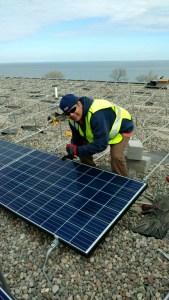On August 16, 2022, President Joe Biden signed the Inflation Reduction Act into law. It aims to reduce inflation by spurring new domestic manufacturing projects and lowering costs for Americans, all while making historic investments toward climate goals. In one short year, the Inflation Reduction Act has created an estimated 170,606 jobs, and 272 new clean energy projects have been announced. Millions of Medicare recipients are saving hundreds of dollars annually on prescriptions. As the largest investment in addressing climate change in American history, the Inflation Reduction Act is bringing once-in-a-lifetime investments to communities across the country.
The law will shape the future of America in the coming years and decades—and in just the first year since its passage, it has had tangible impacts on everyday Americans. This collection features a few of the many Americans who have benefited from the Inflation Reduction Act.
Historic job creation
The Inflation Reduction Act is projected to create 9 million jobs over the next decade—and within the first six months of its passage, this historic investment spurred the creation of nearly 200,000 clean energy jobs. Below, hear from some of the workers across the country who represent these 9 million future jobs.
Qiana Moore, apprentice electrician with IBEW Local 665
Location: Jackson, Michigan

Qiana Moore pictured in October 2020. (Photo credit: Miame Jarrett)
After spending 20 years working in pharmacy management, Qiana Moore was still not making the kind of income or benefits she desired for her life. She decided to enter an electrical work union apprenticeship in 2021 and now sees a future with a good income and a comfortable retirement. Because of funds from the Inflation Reduction Act for apprenticeships, middle-class careers like Qiana’s are becoming more accessible to Americans of all ages and backgrounds. Additionally, the home energy rebates from the Inflation Reduction Act create more work opportunities for existing and future electricians.
“From what I’ve read, the Inflation Reduction Act provides incentives for rewiring your home—new electrical panels, a new furnace, a new dryer,” shared Qiana. “All of these incentives for new appliances are going toward the goal of changing over from fossil fuels to electric sources of energy. That’s an amazing incentive for our environment, and it’s an amazing opportunity for electricians like me.”
Read more of Qiana’s story.
Raquell Rivera, journeywoman carpenter with Carpenters Local 1004
Location: Lansing, Michigan

Raquell Rivera pictured in April 2023. (Photo credit: Tori Menold)
At age 19, Raquell Rivera was homeless, spending most of her nights at a local youth shelter in Lansing. But after starting an apprenticeship to become a union carpenter, her financial situation began to improve. Since graduating from the program this year, Raquell has been able to buy a car and become a homeowner. The Inflation Reduction Act expands apprenticeship opportunities like the one that pulled Raquell out of housing insecurity and creates decades of work in her industry.
“Right now, America’s trades can’t go anywhere but forward, especially with a lot of these green energy opportunities—solar panels, electric vehicle battery plants, and the like,” explained Raquell. “These Inflation Reduction Act investments are creating more work that can’t be shipped out of the country, and those careers are providing people with the opportunity to make a livable, middle-class wage for their families.”
Read more of Raquell’s story.
Marsha Nebel, founder of the Northeast Wisconsin chapter of empowHER
Location: Green Bay, Wisconsin

Marsha Nebel pictured in July 2016. (Photo credit: Marsha Nebel)
To meet the clean energy demands of the future, the Inflation Reduction Act aims to expand and diversify the labor pool through workforce development and apprenticeship programs. Such apprenticeship programs helped Marsha Nebel enter the trades and make a stable, middle-class living through her union. Now, she works to help women enter the trades through the organization empowHER. Marsha believes that the Inflation Reduction Act extends more opportunities like the one she had and advances gender equity in the trades.
“There is so much work available in the trades today that we are struggling to fill all of our calls,” said Marsha. “Here in Green Bay, we currently have 42 first-year electrician apprentices, which is more than we’ve ever had. And by the time the training year starts, I anticipate it’ll be closer to 50. There was a huge solar project happening here in Northeast Wisconsin, and I think we had five women join apprenticeships from that alone. That is just one of many success stories from these investments.”
Read more of Marsha’s story.
Michael D’Amico, automotive system technician
Location: Pittsboro, North Carolina

Michael D’Amico pictured in June 2023. (Photo credit: Michael D’Amico)
As the cost of attending higher education institutions continues to increase, many young people are looking to technical education programs to jump-start their careers. Michael D’Amico of Pittsboro, North Carolina, enrolled in an automotive system technology program at his local community college to get a job working on cars. Since the enactment of the Inflation Reduction Act, newly announced electric vehicle (EV) manufacturing plants are bringing hundreds of thousands of job opportunities to students like Michael.
“I have had a fire-burning passion for cars since I could remember. I’m really excited to see more EV manufacturers coming to North Carolina,” said Michael. “Everyone thinks of Detroit when they think of car manufacturing. But to say in five to six years that Chatham County, North Carolina, will be known for making cars is so cool. VinFast is bringing 7,000 jobs to my backyard, and I hope to work there someday.”
Read more of Michael’s story.
Boosting small businesses
Robert Blake, owner of Solar Bear, a solar project company, and executive director of Native Sun Community Power Development
Location: Saint Paul, Minnesota

Robert Blake pictured in May 2018. (Photo credit: Robert Blake)
The Inflation Reduction Act expanded the solar installation tax credit and created a direct pay provision to help nonprofit, government, and Tribal entities install solar panels on their buildings. For small-business owner Robert Blake, these provisions are expanding access to solar and boosting his solar business in the process.
“Resiliency, adaptation, and sovereignty are all important when it comes to Native communities,” said Robert. “Solar speaks to all of those goals. As a solar small-business owner and Indigenous person, I think the Inflation Reduction Act is a game-changer for my business, community, and the planet.”
Read more of Robert’s story.
D.R. Richardson, co-founder of Elephant Energy
Location: Denver, Colorado

D.R. Richardson pictured in May 2021. (Photo credit: Carey DeGenaro)
With the Inflation Reduction Act’s rebates for home electrification, households can save up to $1,800 annually on their electric bills. The act induced a spike in demand that enabled D.R. Richardson’s business, which specializes in home electrification, to grow from two employees to nearly 20.
“Our business has seen a huge amount of demand for heat pumps and heat pump water heaters directly as a result of this law,” said D.R. “The Inflation Reduction Act has enabled electrification to be even more cost competitive—reducing energy bill burdens, reducing inflation, and enabling average Americans to invest in domestic residential infrastructure. You want to invest in domestic infrastructure? Build more heat pumps.”
Read more of D.R.’s story.
Kevin Kane, co-founder of Green Homeowners United
Location: West Allis, Wisconsin

Kevin Kane pictured in September 2021. (Photo credit: Erick Shambarger, Milwaukee Environmental Collaboration Office)
The Inflation Reduction Act created and expanded tax credits and rebates for energy efficiency home improvements that lower energy bills and cut emissions. These incentives build upon the city of Milwaukee’s Environmental Collaboration Office’s decadelong history of providing home energy efficiency programs. For businesses such as Green Homeowners United, the Inflation Reduction Act is boosting businesses, including Kevin Kane’s, so they can create more high-paying, stable jobs in their communities.
“The Inflation Reduction Act will allow a firm like ours to help thousands of local residents save money on their utility bills while cutting their carbon emissions,” said Kevin. “It will be huge for us, and it is exactly what we need to address climate change. We are excited to hire a lot more union laborers. We want to prove creating family-supporting jobs, cutting energy costs, and fighting climate change go hand in hand.”
Read more of Kevin’s story.
Sue Damron, president and CEO of Schuler’s Restaurant & Pub
Location: Marshall, Michigan

Sue Damron pictured in 2018. (Photo credit: Dennis Craft)
After large manufacturers left Marshall, Michigan, local business owner Sue felt the impact on her restaurant. But since the Inflation Reduction Act was passed, large-scale manufacturing projects, such as the Ford BlueOval project in Marshall, have begun returning to America. Such projects, incentivized by Inflation Reduction Act tax credits, are bringing thousands of jobs back to communities such as Sue’s.
“Our historic town has lost thousands of jobs after manufacturers left over recent decades,” shared Sue. “As a small-business owner, I’m excited for the new Ford manufacturing plant coming to our town. The thousands of jobs created mean new residents will walk down our main street, eat lunch at Schuler’s, go shopping at the Mole Hole, and grab a coffee at Serendipity. It will absolutely change our community in the best way.”
Read more of Sue’s story.
Lowering costs
Susan Robertson, retired Michigander and cervical cancer survivor
Location: Lansing, Michigan

Susan Robertson pictured in July 2023. (Photo credit: Susan Robertson)
For years, the high costs of copays prevented many older Americans from getting recommended vaccines. But since the Inflation Reduction Act eliminated vaccine cost sharing for Medicare recipients, older Americans such as Susan Robertson can afford to get long-awaited vaccinations.
“I had to put the shingles vaccine lower on my list of priorities because, as a senior on a fixed income, the $400 copay was cost prohibitive,” explained Susan. “What happens in those situations, what you do then is gamble that you are not going to get shingles anytime soon and you put it off. But I was relieved to see I could get it at no cost after the Inflation Reduction Act passed. It’s been a major blessing to get the shingles vaccine with no copay; this is a life-changing policy.”
Read more of Susan’s story.
Marian Baker, apprentice carpenter with Carpenters Local 1004
Location: Lansing, Michigan

Marian Baker pictured in February 2022. (Photo credit: Jose Sanchez)
Marian Baker’s career as a union carpenter enabled her to buy her first home in 2022, a fixer-upper in need of new appliances. With the passage of the Inflation Reduction Act, homeowners such as Marian can take advantage of tax credits and rebates to make energy efficient home improvements at low to no cost. These home improvements, from heat pumps to induction stoves to insulation, are simultaneously reducing Americans’ monthly energy costs and household carbon emissions.
“Based on the promises of the Inflation Reduction Act, not only have investments already been made in projects slated to create work for carpenters like me, but I also am depending on it to pay for necessary projects in my home,” said Marian. “I am very excited about the Inflation Reduction Act’s High-Efficiency Electric Home Rebate Act (HEEHRA) program, as I just bought a 100-year-old house last year that needed a lot of work. I badly need an electrical panel upgrade, especially after choosing to switch from a gas to an induction-powered stove. The HEEHRA program will allow me to perform this upgrade at no cost!”
Read more of Marian’s story.
Alisha Vasquez, co-director of the Mexican American Heritage and History Museum
Location: Tucson, Arizona

Alisha Vasquez pictured in July 2022. (Photo credit: Luis Garza)
Lower-income households spend as much as three times more on energy costs than high-income households, with the energy burden disproportionately affecting African Americans and Latinos. But reducing energy costs through the adoption of clean energy also has been traditionally out of reach for these households. The Inflation Reduction Act’s expanded solar installation tax credits, however, allow families such as the Vasquezs to transition their homes to clean energy more easily.
“My partner and I always wanted solar but didn’t think we could afford it,” said Alisha Vasquez. “When you have student loans and are a parent, it’s one of those things that was considered a luxury item. So after we got a grant to cover half of the cost, installing solar was more manageable, and knowing we could get 26 percent back on the rest sweetened the deal. We were prepared for the tax credit to decrease to 22 percent in 2023 and were rushing to get our system installed. But once the Inflation Reduction Act passed, it was like the time crunch didn’t matter, and the tax credit increased to 30 percent, which was great. This enabled us to go green, and this is a way for more equity to solar and who has access to it.”
Read more of Alisha’s story.
Robin Craycroft, licensed therapist and older American with Type 1 diabetes
Location: Springfield, Missouri

Robin Craycroft pictured in August 2022. (Photo credit: Duncan Craycroft)
Nearly 4 million Medicare recipients live with diabetes, and many of them struggle to afford their insulin. Since the $35 insulin Medicare copay cap was implemented in January 2023, Robin Craycroft has experienced the life-changing impact of the Inflation Reduction Act.
“President Biden’s Inflation Reduction Act changed our lives,” said Robin, a licensed therapist. “It allowed us to pay the remaining credit card balance for the previous year of insulin, increase our savings, and take a trip to see our precious grandsons. We experienced their love, joy, and hugs in person—which was unforgettable!”
Read more of Robin’s story.
Investing in America’s future
In the midst of Earth’s hottest year on record, it’s critical to make progress on the climate crisis. The Inflation Reduction Act puts the United States on track to reduce emissions by as much as 40 percent by 2030. As a result, communities can look forward to cleaner environments with strong economies. Hear from Americans across the country about what this investment means for their communities.
Darren Riley, co-founder and CEO of JustAir
Location: Southwest Detroit, Michigan

Darren Riley pictured in September 2022. (Photo credit: Bryan Lewis)
Southwest Detroit is situated near heavy industrial zones and as a result contains some of the most polluted ZIP codes in the country. When Darren Riley moved to the community and developed asthma, his struggle inspired him to create air-quality monitoring systems to help community members identify poor air quality. With investments from the Inflation Reduction Act to reduce air pollution in environmental justice communities, Darren imagines a future filled with clean air for his community.
“You never forget struggling for air to breathe; it opens your eyes to know that’s the only thing that matters, getting your next breath,” said Darren. “It’s really frightening. The Inflation Reduction Act investment to reduce emissions in industrial zones near neighborhoods like mine is so important. The sizable investment aligns with JustAir’s mission to improve air quality for everyone within our community. It’s a future of hope and a future I am excited to be a part of.”
Read more of Darren’s story.
Yaraneth Marin, southwest regional director for Vote Solar
Location: Phoenix, Arizona

Yaraneth Marin pictured in May 2022. (Photo credit: Sergio Galvan)
Although lower-income communities face higher energy burdens, they are also disproportionately harmed by climate change. For Arizona native and community organizer Yara Marin, the Inflation Reduction Act represents a historic opportunity to advance energy equity while addressing climate concerns.
“Growing up in South Central Phoenix, I never saw solar panels in my neighborhood, so I never got excited about it,” said Yara. “The Inflation Reduction Act investments in expanding solar energy drive down energy costs for families while reducing barriers to solar and other zero-emission technologies in historically low-income and environmental justice communities, creating thousands of new jobs for our people. This is a major economic opportunity for our country, and we are already seeing the benefits.”
Read more of Yareneth’s story.
Rukaya Alrubaye, national youth spokesperson for the National Rural Electric Cooperative Association
Location: Fayetteville, Arkansas

Rukaya Alrubaye pictured in February 2023. (Photo credit: Denny Gainer)
Rural electric cooperatives provide 42 million people with reliable and affordable energy. The Inflation Reduction Act made direct-pay tax credits and clean energy incentives available to rural electric co-ops to expand and diversify their energy systems. Arkansas teen Rukaya Alrubaye knows how important electric co-ops are for providing energy in communities such as hers. Rukaya, a member of a first-generation family originally from Iraq, has experienced energy insecurity, which informed her advocacy for expanding energy access.
“As my community continues to introduce new clean energy sources, it is very reassuring that the Inflation Reduction Act supports these efforts,” said Rukaya. “My family just switched to solar energy because of the climate and economic benefits involved, which have been made possible because of programs such as those implemented by the Inflation Reduction Act. It’s very special to know that those we elect into power are using their power wisely to do good. I hope we continue to work together to address climate change issues because they impact every person on this planet.”
Read more of Rukaya’s story.
Juan-Pablo Correa-Baena, assistant professor and the Goizueta junior faculty rotating chair in the School of Materials Science and Engineering at the Georgia Institute of Technology
Location: Atlanta, Georgia

Juan-Pablo Correa-Baena pictured in May 2020. (Photo credit: Marianna Freudzon)
With almost all solar manufacturing concentrated in China and East Asia, the lack of domestic manufacturing represents an economic and national security concern. Shortly after the Inflation Reduction Act was signed, however, the largest solar manufacturing investment in American history was announced: a new Qcells manufacturing plant in Northwest Georgia. The plant will provide professor Juan-Pablo Correa-Baena’s students with thousands of new opportunities.
“The Inflation Reduction Act has opened a whole new career path for my students and thousands of people here in Georgia,” said Juan-Pablo. “I am working to partner with Qcells to develop programs that train their future workers. We need to train people at all levels and across all skill sets. From associate degrees to Ph.D. programs, from those constructing the factory to the engineers developing new technologies, we will need to create an entire ecosystem to support this burgeoning industry.”
Read more of Juan-Pablo’s story.
These stories represent the beginning of a new chapter in American history. Through the Inflation Reduction Act, the Biden administration is expanding the middle class with well-paying jobs, helping communities breathe cleaner air, and allowing more Americans to sleep easier knowing they can afford lifesaving health care. With a government focused on cutting costs, supporting the middle class, and protecting the environment for the next generation, every American stands to benefit.